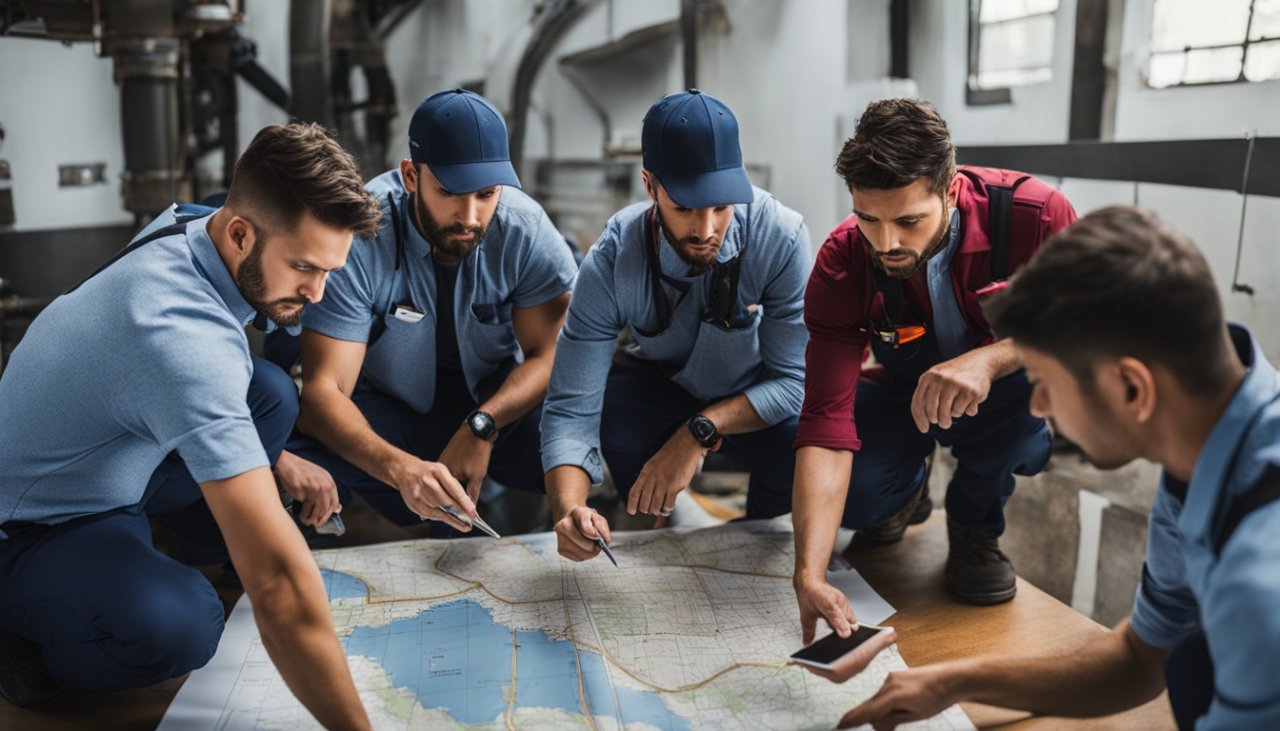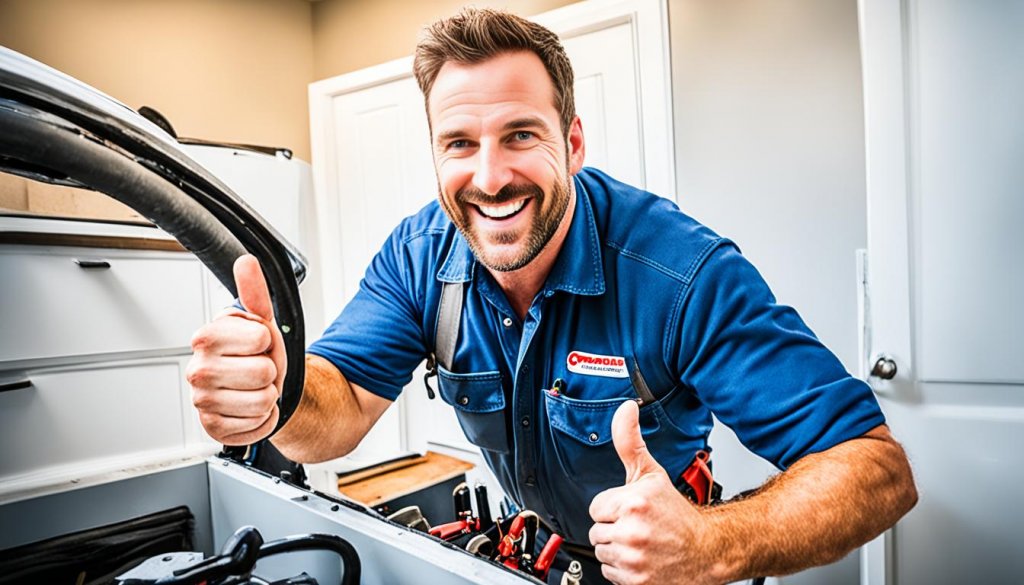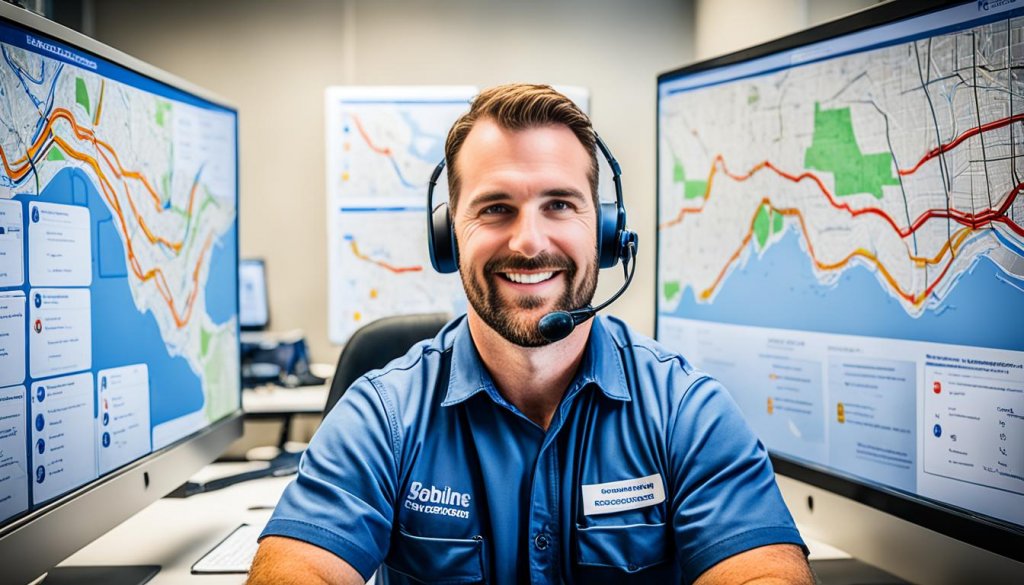Ever thought how fast an emergency plumber can save the day in a plumbing crisis? The key to quick service is in how well you manage your dispatch. For plumbing companies, making your dispatch process better means you can answer urgent calls faster and manage your work better. There are many tools and strategies to help you improve this important part of your business. Let’s look at why good dispatching is key and how it can make your plumbing services better.

Key Takeaways
- Effective dispatching significantly boosts productivity and customer satisfaction.
- Choosing the right plumbing dispatch software is essential for smooth operations.
- Optimizing route planning can reduce commute times and increase appointment availability.
- Prioritizing urgent calls through call triaging enhances response times.
- Consistent communication skills among dispatchers lead to better service delivery.
The Importance of Effective Dispatching in Plumbing Services
As a plumbing industry expert, I know how key effective dispatching is. It ensures quick and efficient service calls. This boosts customer happiness and keeps a company’s good name. For instance, emergency plumbing needs licensed plumbers to get there fast to fix urgent problems and prevent more damage.
Good dispatching is crucial for managing plumbing business resources well. It helps licensed plumbers use their time wisely, cutting down on idle time and boosting work output. Dispatchers keep an eye on service calls to plan logistics and schedules better, making things run smoother.
A well-planned dispatch process is key to handling things like inventory, daily schedules, and reaching out to customers. Without it, plumbing companies might struggle, leading to messy supply orders and unhappy customers. Using smart dispatching helps keep things running smoothly, letting technicians do their best work.
Having skilled dispatchers really changes the game. They’re key to making sure technicians are used well and know what they need to do each day. This is crucial for smooth service and meeting the needs of emergency plumbing services.
Understanding the Role of Plumbing Dispatchers
Plumbing dispatchers are key to a plumbing company’s daily operations. They make sure technicians are scheduled well and routes are planned for quick response times. From my experience, I’ve seen how important they are for smooth service call management.
Key Responsibilities of a Dispatcher
Dispatchers have many tasks that are both challenging and important. They schedule technicians based on how urgent the job is and how busy they are. They talk to customers to let them know when someone will arrive and any changes.
They also manage inventory, keeping track of parts and supplies to avoid delays. Dispatchers work at the crossroads of logistics and customer service, making sure every call is handled well.
Skills Necessary for Successful Dispatching
To be great at dispatching, certain skills are a must. Dispatchers need to handle many tasks at once. They must solve problems quickly and have strong communication and customer service skills to make customers happy.
Knowing how to use dispatch software is also crucial. It helps them manage their work better and work more efficiently. A skilled dispatcher makes a plumbing company more effective and professional.
Challenges Faced in Plumbing Technician Dispatch
In plumbing technician dispatch, I often face many challenges. Each day brings new hurdles, like managing tight deadlines, communication problems, and planning routes. It’s crucial to handle these well.
Tight Deadlines and Uneven Workflows
Tight deadlines can be stressful, especially in busy repair seasons. Workloads change often, making it hard to plan plumbing services well. Managing time well is key to getting emergency plumbers to customers on time. But, the pressure can sometimes feel overwhelming.
Poor Communication with Customers
Good communication is key to making customers happy. If there’s a delay, not keeping customers updated can make them upset. About 92% of customers look at price first, but they also want to be kept in the loop. Talking with customers regularly helps build trust and keeps relationships strong.
Inefficient Route Planning
Old ways of planning routes can waste a lot of time. If I don’t plan well, plumbers might arrive late, which hurts service quality. Customers expect quick service, especially in emergencies. Using better planning tools can make things run smoother and improve customer satisfaction. This way, plumbers can get to where they need to go faster.
Benefits of Optimized Technician Dispatch
Optimized technician dispatch is key in the plumbing world, especially for emergency services. It makes operations more efficient and improves customer happiness. With new dispatch tech, companies can make their processes smoother. This means technicians get sent out fast and right.
Improved Response Times for Emergency Plumbing Services
Automated dispatch tools cut down on wait times, making emergency plumbing help quicker. This is vital because people in crisis need help fast. Smart scheduling helps contractors use their resources well. This tech can make response times 20-40% faster, giving plumbing companies an edge.
Enhanced Customer Satisfaction and Retention
Optimized dispatch means better updates and tracking for plumbing techs and customers. Customers know when the tech will arrive and the job’s progress. This builds trust and transparency.
Modern dispatch tools work well with other systems, making sure techs have what they need. When customers get quick and effective service, they’re happier. This leads to more loyalty and a better reputation for the plumbing company.

Implementing Effective Dispatch Strategies
In today’s fast world, having good dispatch strategies is key for top-notch plumbing services. Dispatchers are vital in making sure plumbers get to where they need to go fast, especially when it’s busy. By sorting service calls first, we can make sure customers get help faster and are happier.
Prioritizing Triage in Service Calls
A triage system helps me quickly spot urgent dispatch needs. It lets me know which calls need fast action. This way, serious problems get fixed right away. It makes managing work better, keeps customers happy, and builds loyalty.
Front-Loading Workdays for Efficiency
Front-loading workdays with less urgent calls boosts productivity. Doing simpler tasks early gives me a safety net for surprises later. This way, plumbers can handle urgent matters without getting stressed. It makes sure all work is done on time and meets customer needs without delay.
Utilizing Plumbing Dispatch Software
In today’s fast world, plumbing dispatch software is key for plumbing companies. It helps manage operations well, from setting up appointments to tracking vehicles. The right software can greatly improve dispatch efficiency and service quality.
Choosing the Right Software for Your Plumbing Company
Choosing plumbing dispatch software needs careful thought about your company’s needs. Look for features like automated scheduling, managing customers, and tracking vehicles. A good solution makes operations smoother, leading to quicker service and high quality. It should also work well with accounting tools like QuickBooks, making money management easy.
Features to Look for in Dispatch Software
When looking at dispatch software, focus on key features for success. Automated routing helps plan schedules better, cuts down on travel time, and boosts productivity. Real-time updates on jobs give clear insights into what’s happening in the field, helping talk better with clients.
Other important parts include detailed reports, managing customer relationships, and taking digital payments. These features help with cash flow and make customers happier. Together, they make dispatch work better for plumbing companies.
Route Optimization for Plumbing Technicians
In the fast-paced world of plumbing, being efficient is crucial. Using effective route optimization can greatly improve how plumbing technicians work. It helps them get to customer locations faster and more efficiently.
Understanding GPS and Route Planning Systems
GPS systems are key in modern plumbing dispatch. They let dispatchers track where technicians are in real-time. This helps assign jobs based on how close they are, making sure plumbers get to urgent jobs quickly.
Tools like Upper’s plumbing route optimization software make this process automatic. They look at traffic and job times to change routes on the fly. This means plumbers spend less time driving and more time fixing problems.
Benefits of Automated Route Optimization
Automated route optimization brings big benefits to plumbing companies. It cuts down on travel time, which means less fuel used and lower costs. Companies using Upper’s dispatch software see a 20% jump in finished jobs.
This software makes assigning jobs easier by matching plumbers with the right tasks. It looks at their location and skills. Plus, it gives accurate time estimates, making customers happier.
Training Dispatchers and Technicians for Success
Training dispatchers and technicians is key for a plumbing service’s success. Good communication skills help bridge the gap between them. This ensures that customer needs are met quickly and efficiently.
Investing in training helps them handle complex situations better. This improves the quality of service.
Developing Effective Communication Skills
Dispatchers need strong skills like conflict resolution and active listening. These skills boost customer satisfaction. A skilled dispatcher makes sure communication flows well, helping with plumbing technician dispatch.
Regular check-ins help teams solve problems fast. This keeps the workflow smooth.
Encouraging Team Collaboration
Team collaboration makes plumbing services more efficient. When dispatchers and technicians work well together, they can quickly adjust to new situations. This ensures customers get help without delays.
Adding team-building activities to training programs helps team members get along better. It also lifts morale across the team.

How to Measure the Success of Your Dispatch Operations
Understanding key performance indicators (KPIs) is key to measuring dispatch success. These metrics highlight important areas like how fast you respond and how happy customers are. By tracking these, plumbing businesses can see how well technicians work and make sure dispatch runs smoothly.
Key Performance Indicators for Dispatching Efficiency
Setting up the right KPIs helps check how efficient dispatch is and sets goals to aim for. Important metrics include how often technicians are available, the number of urgent calls, and how fast you respond. By sorting customer requests and figuring out dispatch success chances, businesses can improve their plans. This leads to better performance.
Regularly Reviewing and Adjusting Processes
Checking your current processes often helps spot where things can be better in dispatching technicians. When things change, tweaking your workflow can make things run smoother. This keeps improving, which makes customers happier and more likely to stay, and makes dispatch more efficient.
Plumbing Technician Dispatch Best Practices
Effective plumbing technician dispatch relies on key best practices. Investing in employee training is crucial. It helps dispatchers and technicians tackle challenges with confidence and boosts their skills.
When the team knows the latest tools and techniques, service quality goes up. This makes clients happier.
Investing in Training and Development
Putting employee training first boosts individual and team performance. Regular workshops and certifications keep technicians updated with new plumbing tech and green practices. This commitment to learning makes customers trust us more, as they get modern solutions that fit their needs.
Maintaining Consistent Communication with Team Members
Good communication keeps the team working well together. Keeping everyone updated and giving feedback makes dispatching smoother. Using tech like scheduling software and mobile apps helps too.
Having a clear way to talk with each other helps spot when we need more drivers. This prevents delays and keeps service running smoothly. Strengthening the team makes dispatching plumbing technicians easier.
Case Studies of Successful Dispatch Optimization
Looking at real examples shows how dispatch optimization helps plumbing companies. These stories share strategies that make service better and more efficient.
Real-World Examples from Plumbing Companies
A top HVAC company used new dispatching software to boost technician efficiency. This tech cut downtime and let them finish more jobs daily. It made the company more productive and helped serve customers better.
Valley Plumbing in Salt Lake City improved by training dispatchers. This led to higher customer satisfaction and more repeat business. Training staff was key to better service and customer loyalty.
An electrical service company also made a big leap by adding GPS to its dispatch. This cut down on travel time for technicians. Being on time became more common, showing the value of tech in dispatch.
Lessons Learned and Applied Best Practices
These stories teach important lessons for plumbing companies. To handle lots of calls, use systems like IVR and add staff when it’s busy. Having backup techs and flexible schedules helps with unexpected problems.
Knowing what customers want is also key. Dispatchers who use customer data can respond quicker and meet customer needs. Using modern plumbing software increases efficiency, cuts costs, and makes customers happier. These strategies are proactive ways to improve dispatch for plumbing services.
Conclusion
Optimized plumbing technician dispatch is key to better service, happier customers, and smoother operations. By addressing common issues and using best practices, plumbing companies can make their dispatch system strong. This approach helps meet and often beat customer expectations.
Tools like FieldAx’s call booking software help businesses run better, leading to more money made. This software tracks calls and lets customer service reps talk to clients in a personal way. These tools make plumbing services better and help build stronger bonds between technicians and customers.
My experience shows that the right tech and training are crucial for success in plumbing. Good communication and using effective call center scripts make things run smoother and make customers happier. A well-run dispatch system helps a company offer excellent plumbing services. It makes sure every customer gets quick and reliable help.
See how FieldAx can transform your Field Operations.
Try it today! Book Demo
You are one click away from your customized FieldAx Demo!
FAQ
What is plumbing technician dispatch and why is it important?
Plumbing technician dispatch means managing plumbers for service calls. It’s key for quick responses, especially in emergencies. This boosts customer happiness.
How do dispatchers optimize routes for plumbing technicians?
Dispatchers use GPS and planning systems to find the best routes. This cuts down on travel time and helps technicians get to emergencies fast. Automated systems also adjust routes on the go based on traffic.
What key skills are needed for effective plumbing dispatching?
Good dispatchers need to handle many tasks at once, solve problems quickly, and communicate well. Knowing dispatch software is also crucial for managing work well.
How can I ensure my plumbing company offers 24/7 plumbing service?
For 24/7 service, focus on urgent calls and schedule wisely. Using dispatch software helps keep you ready to respond at all hours.
What challenges do dispatchers face in the plumbing industry?
Dispatchers deal with tight deadlines, changing workloads, poor customer communication, and bad route planning. These issues can hurt service quality and make customers unhappy.
What are some best practices for plumbing technician dispatch?
Good practices include training dispatchers and technicians, keeping team communication open, and checking performance to improve.
How do I measure dispatch efficiency in my plumbing company?
Track response times, customer satisfaction, and technician productivity to measure efficiency. Checking these metrics often helps improve dispatch work.
Why is training necessary for dispatchers and technicians?
Training helps dispatchers and technicians know their roles and work together well. Better communication makes operations smoother and service better.
Can you give an example of successful dispatch optimization?
Yes! Many plumbing companies have gotten better by using advanced dispatch software and improving team talk. These steps lead to faster responses and happier customers.
Author Bio
Co-Founder & CMO at Merfantz Technologies Pvt Ltd | Marketing Manager for FieldAx Field Service Software | Salesforce All-Star Ranger and Community Contributor | Salesforce Content Creation for Knowledge Sharing






